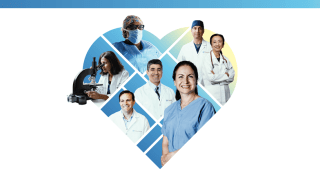Cancer is one of the most formidable challenges in health care, and those who treat it are the embodiment of unwavering dedication, compassion and expertise. At City of Hope®, our physicians strive to alleviate suffering and restore hope to every patient who walks through our doors. On National Doctors Day, we recognize these hardworking, innovative and talented individuals and the profound impact they have on the patients they treat and society at large.
To commemorate this day, we spoke to City of Hope physicians from around the system about what initially drew them to the challenging yet rewarding field of oncology, the strategies they employ to stay motivated and grounded amid the rigors of their work, and how they rejuvenate during their off time.
His Heroes Are His Patients
Marcel van den Brink, M.D., Ph.D., starkly remembers the first patient he saw as a medical student: a young man his own age dying of metastatic melanoma. Van den Brink watched, “completely useless,” as the 24-year-old drew his last breath. The patient’s youth “left such an impression.” It made him realize that he wanted “to do something that really matters. To try to go all out and fight the biggest diseases and the most desperate situations in health care — and cancer definitely was that when I was going through my training.”
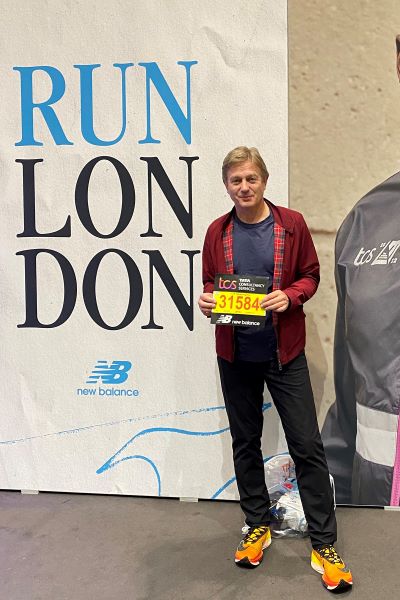
It’s no surprise, then, that Van den Brink, president of City of Hope Los Angeles, City of Hope National Medical Center and the Deana and Steve Campbell Chief Physician Executive Distinguished Chair, has devoted his life and much of his research focus to making the treatment process better and easier for patients, such as optimizing bone marrow and stem cell transplant procedures to make them less toxic and lower the rate of recurrence.
His work is known around the world, but he is careful to remain grounded. “It’s incredibly important to stay humble,” he says, “and to understand who you are and the role you play in somebody’s life, and to not fall into what I would call the ‘God complex.’ Because yes, you’ve got a lot of people who are going to give you enormous praise, but you can’t let it go to your head.”
His heroes are his patients.
“As an oncologist, almost more than any other kind of doctor, people let you into their lives,” he said. “You become very close to patients. There is also a sense of awe, of humility, of gratitude that people trust you so much, that you’re at that critical point in their life next to them, that is very, very special and gratifying. It gives purpose to your life that very few professions and even very few doctors experience.”
And he likes to pass those lessons on to younger colleagues. Van den Brink is known for his inclusive approach to leadership and his devotion to providing junior faculty with mentorship and career development opportunities.
It all makes for an incredibly intense and busy schedule, but Van den Brink finds refuge in exercise, especially running. “It started as something I did because I wanted to stay fit, as a physical exercise,” he said. “Now it’s almost more of a mental exercise. I do a lot of thinking and unwinding, particularly during longer training runs for marathons.” He also loves the arts: music, visual arts, movies — and family above all. “Being close with your own family makes you realize even more how precious family is, and how important relationships are.”
Navigating the Cancer Journey for Patients
Gynecologic oncologist Joshua G. Cohen, M.D., was drawn to the field early in his career “because it is one of the few fields in oncology where you can combine research, surgery, systemic treatments and clinical trials,” he said.
Cohen is a Southern California native who grew up not far from where he treats patients today, at City of Hope Orange County Lennar Cancer Center, where he serves as medical director of the Gynecologic Cancer Program. And he’s not alone. His twin brother, Seth Cohen, M.D., works there, too. “To be able to spend time with him here, in a place that I grew up, in a community that I love, has been a dream of mine,” he said.
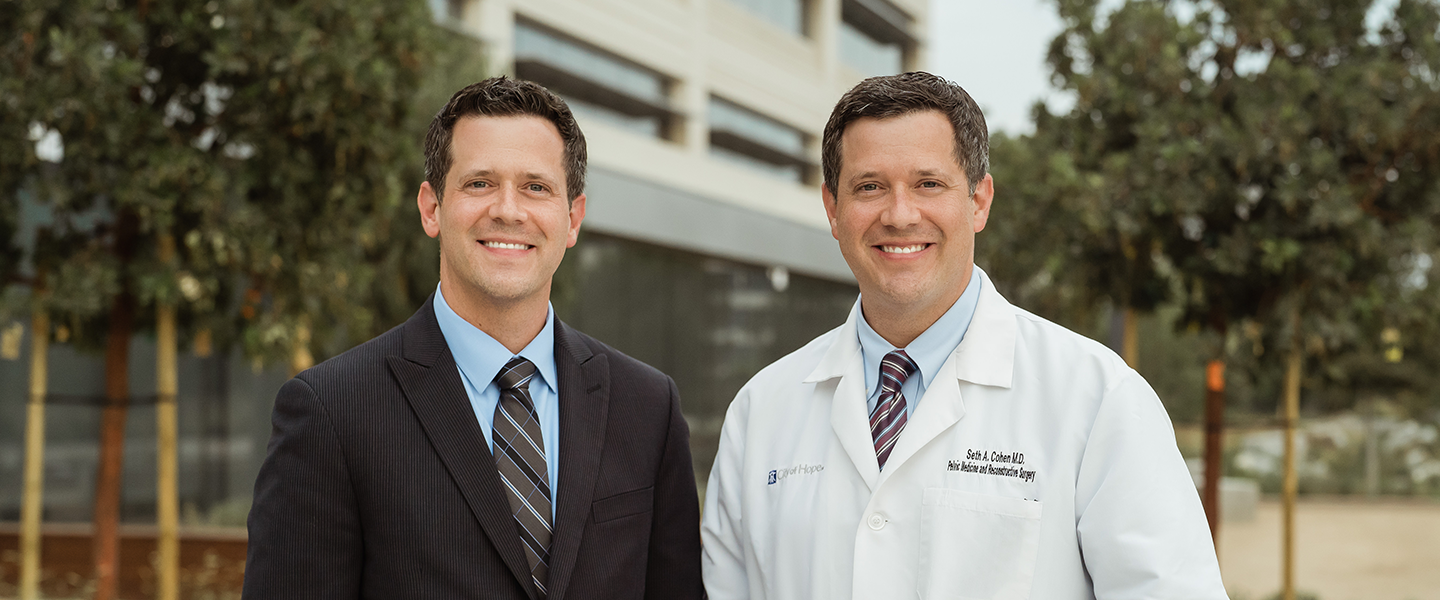
He sees his goal as being the person who helps patients navigate their cancer journey from day one. He understands how scary the sentence, “You have cancer” can be, and he is determined to bring his patients to a better place. “I am honored and humbled to be able to be the navigator on so many levels for someone with cancer, from diagnosis and surgery through the systemic treatments,” he said.
It is that caring for patients that motivates him daily, along with the ability to make leading-edge clinical trials available to them.
“In gynecologic oncology, the doctor-patient relationships that develop are often long term,” he explained. “Those relationships keep me grounded because I can have an impact on my patients’ lives over time, helping them achieve their goals and live a meaningful life on their terms.”
Outside of work, Cohen finds meaning in his own life at home with his family. “Spending time with my wife and young twin children always lifts me up and rejuvenates my spirit.”
Reducing the Burden of Cancer
Alan Bryce, M.D., searches daily for a cure for prostate cancer. In that role, he wears dual hats: He is chief clinical officer at City of Hope Cancer Center Phoenix, and he is at the forefront of cancer genomics and novel therapeutics research at Translational Genomics Research Institute (TGen), a City of Hope affiliate.
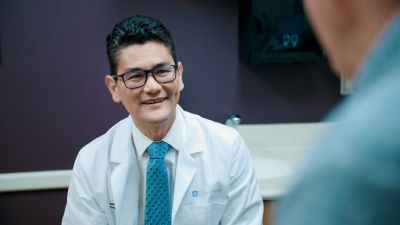
He is the first doctor in his family, and his journey into oncology started with a realization: tackling cancer's complexities represented the meaningful challenge he sought. “I decided I wanted to be an oncologist at a young age,” said Bryce. “I think I was seeing lots of stories about cancer, and it occurred to me that this is a big problem with no easy answers, meaning it was just the kind of hard and important problem that I should devote my career to.”
He knows the burden of cancer suffering is still far too high, and he is committed to reducing it.
“Staying motivated is probably the easiest part of the job,” he said. “I wake up every morning knowing that people need help and that it’s within my power to help them. I never wonder why I am going into work.”
Bryce's humility stems from witnessing patients' grace amid cancer's trials. “Being an oncologist is a humbling profession,” he continued. “Cancer is a tough opponent, so our daily work is a series of miracles and tragedies. Cancer physicians are blessed by having patients who grace us every day with their courage, dignity and generosity.”
Bryce says working with cancer patients helps him appreciate the preciousness of life, something he carries into his home life. “We work every day to help others make the most of their time in this world, and I always have to remind myself to do the same,” he said. “I recover by making sure I am present for my wife and kids, and as long as I do that, it doesn’t matter what we are doing.”
Inspired by His Patients
Saro Armenian, D.O., M.P.H., is devoted to helping perhaps the most challenging and vulnerable of all populations: children with cancer. He says it’s a field that “embodies the essence of healing and human connection.
“I was drawn to pediatric oncology because it is foundational to what we are supposed to do in life, to help one another through the most difficult challenges,” he said. “Pediatric oncology represents the best in team health care delivery, and in the process creates the best work environment a clinician can ask for.”
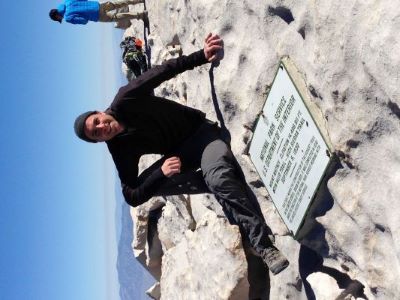
Armenian, the Barron Hilton Chair in Pediatrics at City of Hope Children's Cancer Center, recognizes that treating children can trigger other health challenges — heart disease, different cancers — that can impact a young patient’s entire life. He is determined to find ways to minimize those potential problems.
He finds inspiration in his patients and colleagues. “I am motivated by those around me,” he said. “My patients and their families provide the daily reminder that cure alone is not enough; the work we do does not end when they ring the end-of-treatment bell. They motivate me to stay committed to find better treatments and to optimize the long-term health of the childhood cancer survivor well into adulthood.”
He admires his patients and deeply values his connection to them. “There is nothing more life-affirming than the relationships that are built with patients and their families,” he said, “as we take them from the fears and anxieties of a new cancer diagnosis into a place of hope for a better tomorrow.”
Persistence is key, he says. “I am grounded by the knowledge that progress in our field can be slow. The most difficult problems to solve are the most rewarding.”
When it’s time to decompress, Armenian seeks out the warmth of his family. Especially if they happen to be outside at the time. “I enjoy being outdoors — whether it’s trail running or hiking, it’s always been the right medicine for the challenges of work,” he said. “Ultimately, it’s my family and friends who provide the perspective about the blessings in my life.”
Providing Personalized Cancer Treatment
“The patients keep me going,” says gynecologic oncologist Natalie Godbee, D.O., who practices at City of Hope Cancer Center Atlanta.
Godbee learned about the importance of compassion from a mentor she encountered during her residency. “Not only was he an extremely skilled surgeon and knowledgeable physician,” she said, “but he also connected deeply with his patients. His example reinforced my passion for women's health and showed me how oncology allows one to form meaningful, long-term relationships with patients during challenging times.”
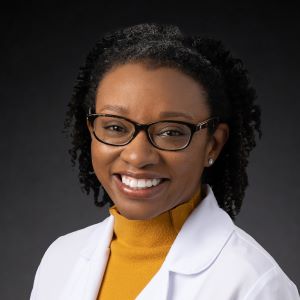
Those relationships are a constant source of inspiration. “Hearing their stories of strength and resilience keeps me dedicated to providing the best possible care,” she said. “When patients express gratitude for the role I play in their cancer journey, it reinforces why I chose this specialty.”
Her goal, she says, is to provide patients with personalized treatment plans while managing their symptoms to enhance quality of life. She is excited about advances in cancer care that are making it possible. “I remain motivated by the constant progress being made in the field of oncology,” she said. “It is inspiring to see new treatments, technologies and clinical trials that improve patient outcomes and quality of life.”
Godbee finds spiritual solace in her faith, which anchors her. “My faith plays an important role in sustaining me through the challenges of this career,” she said. “I find great comfort and strength in knowing God has blessed me with the opportunity to help others. Having this spiritual foundation helps me maintain perspective and optimism, even during difficult times.”
Outside of medicine, Godbee finds great joy in spending time with her family and friends. She likes to cook and try out new recipes. “I also enjoy unwinding by watching comedies, which provides a welcome respite from the stresses of my job,” she says. “Surrounding myself with loved ones and engaging in lighter activities allows me to step away from the demands of my career while still feeling fulfilled on a personal level. This balance is important for sustaining my long-term well-being so I can continue caring for my patients at my best.”
Relieving Cancer’s Effects
Larry Ladi, M.D., is going to help you breathe.
Working out of the Phoenix cancer care center, Ladi serves as an intensivist — a critical care specialist who is most likely to meet his patients in the intensive care unit. He also has decades of experience as an interventional pulmonologist, helping to alleviate the debilitating effects of cancer and cancer treatment. It’s a combination that works for him.
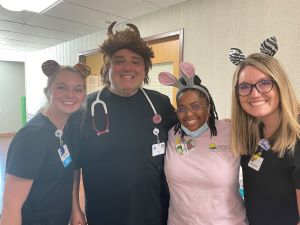
“It wasn’t until my advanced training in interventional pulmonology that my passion for hematology and oncology became a fascination,” he recalled. “My role as an interventional pulmonologist allowed me to use my skills to not only help in the diagnosis of malignancies, but also to treat and alleviate many times their acute struggles with their disease process. It is my role as an oncological critical care physician that is the hardest and most satisfying at times.”
Seeing patients at perhaps the most difficult time in their lives can be daunting, but Ladi welcomes the challenge. “Knowing that I can be there for my patients and their families during their toughest time and try to help them through their struggle is what keeps me coming back every day,” he said.
Such intense encounters can take a heavy toll. Ladi has two favorite ways to cope.
“Music helps me reconnect and keeps me centered,” he said. “My playlist is so varied, but there is always that one song that hits like no other, especially when I need it most.”
“When I am away from work,” he continued, “I like to go fishing. Even if I don’t catch the ‘big one,’ the water, air and calmness is amazing.
Born to Be an Oncologist
After spending most of her childhood caring for relatives with cancer, Laura Farrington, D.O., believes she was born to be an oncologist.
“I’ve spent my whole life taking care of cancer patients, even as a child,” she said. “In oncology, we are able to improve the lives of every patient who walks into the room, whether it is curing them or even just helping their last days be more comfortable.”
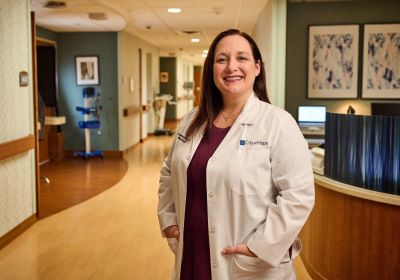
For Farrington, who works as a medical oncologist at City of Hope Cancer Center Chicago, patient triumphs serve as daily affirmations of purpose. “The lives of my patients keep me motivated,” she said. “Every visit, I ask each patient what fun or exciting thing they have done since the last time I saw them. Hearing about their vacations, weddings, concerts, promotions, crafts or holding a new grandchild reminds me why we do this every day.
“Those moments are what we all live for.”
She sees the doctor-patient relationship as a partnership. “A physician should not just tell a patient what to do,” she asserts, “but help the patient decide which path is best for them.” To do that, it is important to understand the unique needs of each individual patient. “A patient is not just a disease. We are not just treating cancer. We are treating a person and using every tool possible to improve length and quality of life.”
Work and family are her anchors, she says. And being active.
“I walk into my home each night with four littles ready for my full attention,” she says. “My commute home is actually one of my favorite parts of the day, when I talk to my mom and sister and listen to audiobooks to prepare myself to give all my love to them.”
And when she plays sports, it’s more than just a way to unwind.
“I find hiking, biking, running and swimming in nature puts it all in perspective,” she explained. “I try to do those active things for all the patients who can’t. I always run at least a 5K on days when my patients are having an amputation.
“My newest hobby is aerial silks. When you are hanging upside down from the ceiling trying to do flips and your muscles ache from trying to keep yourself from falling, all the other worries in life and work are far away.”
